礼貌原则
浅析语用学中的礼貌原则优秀

浅析语用学中的礼貌原则优秀1.言而有信言而有信是语用学中的一项重要礼貌原则。
它意味着我们在交流中应保持诚信和可靠性。
言而有信要求我们遵守承诺,不轻易改变自己的言辞,并尽可能做到言行一致。
只有在言而有信的基础上,我们才能建立起良好的交流关系,维护和增进彼此的信任。
2.尊重他人尊重他人是另一个重要的礼貌原则。
在交流中,我们应该充分尊重对方的观点、意见和感受。
尊重他人意味着我们要听取对方的意见,不轻易批评或贬低他人的观点,并尽量避免使用冒犯性或侮辱性的语言。
尊重他人不仅能建立良好的沟通氛围,还能增进和谐的人际关系。
3.温和而友好在语用学中,温和而友好是礼貌的表现之一、我们在交流中应该使用温和而友好的语言,以表达自己的观点和感受。
温和而友好的语言能够给人留下积极的印象,并使交流更加融洽和有效。
与此同时,温和而友好的语言能够缓解紧张和冲突,促进合作与理解。
4.倾听和回应在交流中,倾听和回应是非常重要的礼貌原则。
倾听意味着我们应该给对方足够的注意力和关注,不打断对方的发言,不中途中断或转移话题。
回应则是指我们对对方的发言做出积极的反馈,表达理解、认同或回答问题。
倾听和回应能够表明我们对对方的尊重和关心,提高交流的效果和质量。
5.避免偏见和歧视语用学中的礼貌原则还包括避免偏见和歧视。
在交流中,我们应该摒弃对他人的有偏见或歧视,并尽量避免以国家、种族、性别、年龄、宗教等因素为基础的歧视性言语。
避免偏见和歧视能够维护公平和尊严,促进平等和友好的交流环境。
6.真诚和坦率真诚和坦率是礼貌中的重要元素。
在交流中,我们应该坦诚地表达自己的想法和感受,不隐瞒或伪装自己的真实意图。
同时,我们也要对他人的真诚和坦率做出回应,不以欺骗或虚伪的方式回应对方。
真诚和坦率能够增进交流的透明度和信任度,助于建立真实而深入的沟通关系。
7.尊重个人空间在交流中,尊重个人空间也是一项重要的礼貌原则。
我们应该尊重对方的私人领域和边界,不过于侵犯或侵害对方的个人空间。
礼貌原则

人们的言语交际受到一定条件的制约,在不同的谈话阶段谈话者都围绕着一个相同的目的,相互配合、共同信守着一定的基本原则。
美国语言学家格莱斯提出了合作原则的概念,成为了语用学的核心内容,并作为指导言语交际的重要原则,得到普遍认同。
格莱斯将合作原则分解为四项准则:数量、质量、关联、方式准则。
1.量的准则:所说的话应该包含交谈目的所需要的信息,所说的话不应包含超出需要的信息。
2.质的准则:不要说自知是虚假的话;不要说缺乏足够证据的话。
3.关联准则:话语的内容要切题。
4.方式准则:话语要清楚明白。
避免晦涩,避免歧义,简练有条理。
合作原则是保证交际顺利进行的重要因素,但人们在交谈过程中并不总是遵守合作原则。
英国语言学家利奇认为,有一部分违背合作原则的行为是出于礼貌的原因,是为了不伤害交际对象的面子。
对此,利奇于1983年在其《语用学原则》中提出“礼貌原则”的概念。
利奇认为“礼貌原则不能被视为添加到合作原则上去的另一个原则,而是为了援救合作原则解决一系列麻烦的一种必要补充。
”礼貌原则成为和合作原则并存互补的交际原则,用来规范交际主体的言语行为。
而利奇的合作原则包括六项准则:(1)策略准则(用于指令和承诺)(a)使他人受损最小(b)使他人受惠最大(2)宽宏准则(用于指令和承诺)(a)使自身受惠最小 (b)使自身受损最大(3)赞扬准则(用于表情和表述)(a)尽力缩小最他人的贬损 (b)尽力夸大对他人的赞扬(4)谦虚准则(用于表情和表述)(a)尽力缩小对自身的赞扬 (b)尽力夸大对自身的贬损(5)赞同准则(用于表述)(a)尽力缩小自身和他人之间的分歧 (b)尽力夸大自身和他人之间的一致(6)同情准则(用于表述)(a)尽力缩小自身对他人的厌恶 (b)尽力夸大自身对他人的同情而这六项准则按照内容和所规范的言语行为,归纳为三项准则:1.少损人利己的准则。
要求交际主体在发出指令或做出承诺的时候,不因为自己的利益而过多地损害别人。
leech(1983)礼貌原则中

概述1. 礼貌原则是语言交际中一个重要的概念,它决定了人们在交流中应该如何说话、做事,以及如何与他人相处。
Leech(1983)对礼貌原则做出了系统的研究和分类,成为了语言学中的重要理论。
主体2. 礼貌原则的定义2.1 礼貌原则是指在交际过程中尊重他人、以礼相待的基本准则。
它包括了人们在交际中应该遵循的一系列规范和行为方式,涉及到人际关系、社会礼仪、谈吐举止等方面。
2.2 Leech(1983)将礼貌原则分为七条基本准则,包括了酬答原则、耐心原则、恰当原则、天真原则、合作原则、同情原则和尊重原则。
这七条准则涵盖了语言交际中的各种场景和情境,为我们理解和运用礼貌原则提供了重要的指导。
3. 礼貌原则的重要性3.1 礼貌是一种社会文明的表现,它体现了一个人的修养和素质。
在社会交往中,礼貌可以让人们彼此之间更加和谐,减少冲突和摩擦,保持良好的人际关系。
3.2 礼貌也是一种职业素养,对于工作和职场来说尤为重要。
在商务谈判、客户服务、团队协作等方面,礼貌可以帮助人们更好地交流和合作,取得更好的成果。
4. 礼貌原则的运用4.1 在言语交际中,人们应该遵循酬答原则,即对他人的言行应该给予适当的回应。
比如在问候中,对方说“你好”,我们应该回答“你好”或者“你好,我很好”等。
4.2 耐心原则要求人们在交际中要有耐心和善意,尊重他人的意见和观点。
我们应该倾听他人的发言,不插话、不打断,并且给予适当的回应。
5. 礼貌原则的跨文化研究5.1 礼貌原则是受到文化和社会背景的影响的,不同的文化对礼貌的理解和要求都有所不同。
跨文化研究可以帮助我们更好地理解不同文化之间的礼貌差异,避免误解和冲突。
5.2 Leech(1983)的研究也包括了对不同文化中的礼貌原则的比较分析,他发现不同文化中的人们对于礼貌的追求和表达方式各有特点,这为跨文化交际提供了重要的参考。
结论6. 礼貌原则是语言交际中不可或缺的重要概念,它影响着人们的言行举止和人际关系,为人们的交往和交流提供了基本的准则和规范。
商务谈判中礼貌原则的运用

商务谈判中礼貌原则的运用
在商务谈判中,礼貌原则的运用非常重要,它可以帮助建立和谐的合作关系,并为双方达成协议创造一个积极的氛围。
以下是在商务谈判中应用礼貌原则的几个关键方面:
1. 尊重对方:以平等、尊重的态度对待对方,注重倾听并给予对方足够的发言机会,展现尊重对方的观点和意见。
2. 注意语言和行为:使用礼貌、文明的语言和行为进行交流,遵循适当的社交礼仪,如问候、道歉和感谢。
3. 注意沟通方式:使用恰当的沟通方式,确保信息准确传达。
避免过分直接或激烈的表达方式,而选择更温和、合理的方式来表达自己的观点。
4. 建立良好的工作关系:在商务谈判中,寻求建立长期的合作伙伴关系是重要的。
通过友好、合作的态度来促进关系的发展。
5. 理解文化差异:在国际商务谈判中,理解和尊重不同文化之间的差异是至关重要的。
了解对方文化的礼仪、价值观和商业习惯,并根据需要调整自己的行为,以避免误解或冲突。
6. 解决冲突和分歧:当出现分歧或冲突时,保持冷静、客观,寻求共同解决问题的方式,通过建设性的讨论来找到共识。
综上所述,商务谈判中运用礼貌原则可以促进双方的合作和理解,增加谈判成功的机会。
通过尊重、注意沟通方式、建立良好关系和解决冲突,可以为商务谈判的成功达成提供良好的基础。
礼貌原则研究的评述

礼貌原则是指在言语交际中,说话人尽量使自己的言语行为符合 社交期望,从而减少与他人的冲突,保持和谐的人际关系。
起源的研究
学者们从社会学、心理学、语言学等多个角度对礼貌原则的起源 进行了深入的研究。
礼貌原则的发展
早期研究
早期的礼貌原则研究主要集中 在西方文化中,但随着全球化 的推进,越来越多的学者开始 关注不同文化中的礼貌原则。
学、开展线上互动交流等。
03
拓展至其他领域
礼貌原则不仅适用于语言教育领域,还可以拓展至其他领域,如商务
谈判、外交交往等。未来,礼貌原则的研究和应用将更加注重与其他
领域的结合,以发挥其更大的实用价值。
06
结论
主要贡献与不足之处
• 主要贡献 • 礼貌原则的研究有助于深化我们对礼貌现象的认识,为跨文化交际和社交场合提供了有益的指导。 • 研究者们通过对不同文化背景下的礼貌原则的比较分析,揭示了礼貌现象的普遍性和特殊性。 • 礼貌原则的研究成果有助于推动社交语言学、跨文化交际等领域的发展。 • 不足之处 • 当前礼貌原则的研究仍存在一定的局限性,例如,研究方法和数据收集等方面存在主观性和片面性。 • 部分研究过于关注特定文化或语境下的礼貌原则,缺乏普遍适用性和跨文化比较。 • 礼貌原则的界定和分类仍存在争议,需要进一步明确和统一。
对未来研究的建议
• 拓展研究范围 • 进一步拓宽礼貌原则的研究领域,包括不同年龄段、不同社会群体、不同文化背景下的礼貌原则。 • 加强对比研究,深入探讨不同文化背景下礼貌原则的异同及其原因。 • 改进研究方法 • 采用多种研究方法,如定量和定性研究相结合,以提高研究的客观性和准确性。 • 加强对数据采集和分析的技术手段的运用,提高研究的科学性。 • 深化理论研究 • 进一步深化对礼貌原则的理论构建,探讨其本质、特征及功能。 • 加强对其与跨文化交际、社交语言学等领域相关性的研究,推动理论发展。
礼貌原则的定义

礼貌原则的定义
礼貌原则是指在言语交际中应遵守的社会礼貌规范。
礼貌原则是对合作原则的补充和完善,是对不礼貌信念的表达的减弱。
礼貌原则的六条准则是:
1.得体准则:尽量减少有损于别人的观点,尽量增加有益于别人的观点。
也就是要尽量少让别人吃亏,多使别人获益。
2.慷慨准则:尽量减少有益于自己的观点,尽量增加有损于自己的观点。
也就是要尽量少让自己获益,多使自己吃亏。
3.赞誉准则:尽量减少对别人的贬损,尽量增加对别人的赞誉。
4.谦虚准则:尽量减少对自己的赞誉,尽量增加对自己的贬损。
5.一致准则:尽量减少与别人在观点上的不一致,尽量增加与别人在观点上的共同点。
6.同情准则:尽量减少对别人的反感,尽量增加对别人的同情。
以上内容仅供参考,如需更多信息,建议查阅相关文献或咨询语言学家。
关于礼貌原则的参考文献

关于礼貌原则的参考文献参考文献:礼貌原则引言:礼貌是人际交往中至关重要的原则之一,它不仅体现了一个人的素质和修养,还有助于维护社会和谐。
本文将从不同的角度探讨礼貌原则的重要性,并提出一些实用的建议,以帮助人们在日常生活中更好地遵守礼貌原则。
1. 礼貌原则的定义和重要性礼貌原则指的是在人际交往中,遵循一定的行为准则,尊重他人的感受和权益。
它是社会交往中的基本规范,体现了人们对他人的尊重和关爱。
礼貌不仅能够建立良好的人际关系,还有助于提高沟通效果和解决问题的能力。
2. 礼貌原则在不同场合的应用2.1 在家庭中家庭是一个人们日常生活中最重要的社交圈子,遵守礼貌原则对于维护家庭和谐至关重要。
在家庭中,人们应该互相尊重、关心和支持,避免争吵和冲突,以和睦的氛围共同生活。
2.2 在学校或工作场所在学校或工作场所,礼貌原则对于建立良好的人际关系和有效的合作至关重要。
人们应该遵守规章制度,尊重他人的意见和权威,积极参与团队活动,共同努力实现共同目标。
2.3 在公共场合在公共场合,礼貌原则可以增强人们之间的互信和尊重。
人们应该遵守社会公德,礼让他人,尊重他人的空间和权益,保持公共秩序和环境的整洁。
3. 如何遵守礼貌原则3.1 尊重他人尊重是礼貌的基础,人们应该尊重他人的意见、权益和个人空间。
在与他人交谈时,应注意倾听对方的观点,不打断或抢占对话权。
同时,避免侮辱、嘲笑或恶意挑衅他人,以维护和谐的人际关系。
3.2 言行得体礼貌的言行举止可以给人留下良好的印象。
人们应该学会用友善的语言与他人交流,避免使用冒犯或侮辱性的言辞。
此外,注意礼貌地行走、用餐、排队等,以表现出自己的修养和教养。
3.3 关爱他人礼貌不仅是尊重他人,还需要关心和关爱他人。
人们应该表达出对他人的关心和关注,关心他人的需求和感受。
通过问候、帮助他人解决问题或提供帮助,可以建立起互助和友善的社会关系。
结论:礼貌原则是人际交往中的重要准则,它体现了人们对他人的尊重和关爱。
politeness principles礼貌原则
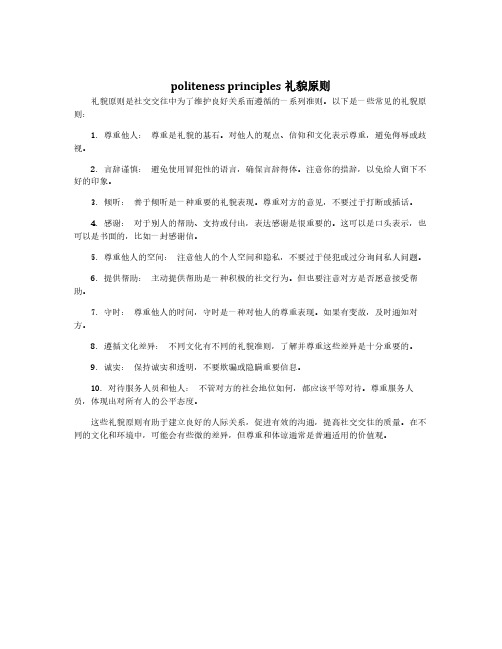
politeness principles礼貌原则
礼貌原则是社交交往中为了维护良好关系而遵循的一系列准则。
以下是一些常见的礼貌原则:
1.尊重他人:尊重是礼貌的基石。
对他人的观点、信仰和文化表示尊重,避免侮辱或歧视。
2.言辞谨慎:避免使用冒犯性的语言,确保言辞得体。
注意你的措辞,以免给人留下不好的印象。
3.倾听:善于倾听是一种重要的礼貌表现。
尊重对方的意见,不要过于打断或插话。
4.感谢:对于别人的帮助、支持或付出,表达感谢是很重要的。
这可以是口头表示,也可以是书面的,比如一封感谢信。
5.尊重他人的空间:注意他人的个人空间和隐私,不要过于侵犯或过分询问私人问题。
6.提供帮助:主动提供帮助是一种积极的社交行为。
但也要注意对方是否愿意接受帮助。
7.守时:尊重他人的时间,守时是一种对他人的尊重表现。
如果有变故,及时通知对方。
8.遵循文化差异:不同文化有不同的礼貌准则,了解并尊重这些差异是十分重要的。
9.诚实:保持诚实和透明,不要欺骗或隐瞒重要信息。
10.对待服务人员和他人:不管对方的社会地位如何,都应该平等对待。
尊重服务人员,体现出对所有人的公平态度。
这些礼貌原则有助于建立良好的人际关系,促进有效的沟通,提高社交交往的质量。
在不同的文化和环境中,可能会有些微的差异,但尊重和体谅通常是普遍适用的价值观。
礼貌原则在商务谈判中的意义
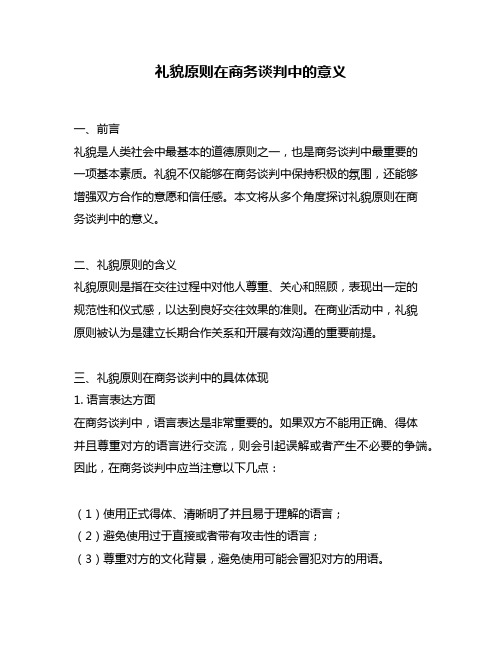
礼貌原则在商务谈判中的意义一、前言礼貌是人类社会中最基本的道德原则之一,也是商务谈判中最重要的一项基本素质。
礼貌不仅能够在商务谈判中保持积极的氛围,还能够增强双方合作的意愿和信任感。
本文将从多个角度探讨礼貌原则在商务谈判中的意义。
二、礼貌原则的含义礼貌原则是指在交往过程中对他人尊重、关心和照顾,表现出一定的规范性和仪式感,以达到良好交往效果的准则。
在商业活动中,礼貌原则被认为是建立长期合作关系和开展有效沟通的重要前提。
三、礼貌原则在商务谈判中的具体体现1. 语言表达方面在商务谈判中,语言表达是非常重要的。
如果双方不能用正确、得体并且尊重对方的语言进行交流,则会引起误解或者产生不必要的争端。
因此,在商务谈判中应当注意以下几点:(1)使用正式得体、清晰明了并且易于理解的语言;(2)避免使用过于直接或者带有攻击性的语言;(3)尊重对方的文化背景,避免使用可能会冒犯对方的用语。
2. 行为举止方面商务谈判中的行为举止也是非常重要的。
一个人的行为举止不仅能够体现出他自身的素质和修养,还能够影响到整个谈判过程。
因此,在商务谈判中应当注意以下几点:(1)遵守基本礼仪规范,如握手、问候等;(2)保持良好的姿态和面部表情,避免出现不适当的动作、表情或姿态;(3)尽量保持冷静、客观,并且不要做出过于激烈或者不理智的行为。
3. 交际技巧方面商务谈判中,交际技巧也是非常重要的。
一个人具备良好的交际技巧可以更好地掌握谈判节奏和氛围,并且更容易达成合作协议。
因此,在商务谈判中应当注意以下几点:(1)善于倾听对方意见,并且给予积极回应;(2)善于引导谈话,避免陷入僵局或者无意义的讨论;(3)善于表达自己的观点,并且能够清晰明了地阐述自己的想法。
四、礼貌原则在商务谈判中的意义1. 保持良好氛围礼貌原则可以帮助双方保持良好的氛围,避免因为语言和行为上的不当而引起不必要的争端。
这对于商务谈判来说非常重要,因为一个良好的氛围可以使双方更加放松,更加愿意合作。
语言学家leech的礼貌原则

语言学家leech的礼貌原则语言学家Geoffrey Leech是一位英国学者,他在20世纪60年代提出了一套有关语言使用中的礼貌原则。
这套原则被广泛认可并被应用于语言学、社会学和语言交际学等领域。
Leech的礼貌原则主要包括六条:合作原则、合适原则、疑问原则、同情原则、力度原则和模糊原则。
首先,合作原则是指说话人努力与他人进行有效的交流,并确保其所说的话符合听话人的期望和需要。
这意味着说话人要避免使用模糊、不清晰或令人困惑的语言。
尽量提供准确、明确和有用的信息,以促进顺畅的交流。
其次,合适原则要求说话人在特定的语境中使用合适的语言和语气。
这个原则强调在不同的社交环境中使用适当的语调、词汇和语法。
因此,说话人需要对不同的听话人有所了解,并相应地调整自己的语言风格。
疑问原则是关于提问的礼貌原则,它强调以礼貌的方式提问,并使用适当的语气和措辞。
说话人应该避免过于直接或冒犯性的问题,并给予听话人足够的空间来回答问题。
这可以建立良好的沟通氛围和相互尊重的关系。
同情原则是指说话人倾听和关心他人的感受、意见和需求。
这个原则强调在交流中表达同情、理解和尊重。
说话人需要展示对他人的尊重和关注,以建立互惠关系和积极的互动。
力度原则强调在交流中使用适度的语气、语音和语言强调。
这意味着说话人应该根据情境和目的,使用适当的语气和语言强调。
适当的力度和重音可以增加语言的表达力和吸引力,但过度使用可能导致冒犯或不适。
最后,模糊原则是指在交流中使用模糊或含糊的语言。
这个原则强调当不能提供准确信息或存在不确定性时,使用模糊的语言更为合适。
模糊语言可以用来缓解紧张局势、暗示或提供灵活性。
这六个原则共同构成了Leech的礼貌原则,它们强调了在语言使用中的礼貌和尊重。
在现实生活中,这些原则对于建立良好的人际关系和有效的交流至关重要。
遵守这些原则可以帮助我们更好地理解和尊重他人,并构建和谐的社交环境。
总结而言,Geoffrey Leech的礼貌原则提供了一个有用的框架,帮助我们在语言使用中更加礼貌和尊重他人。
语用学——礼貌原则
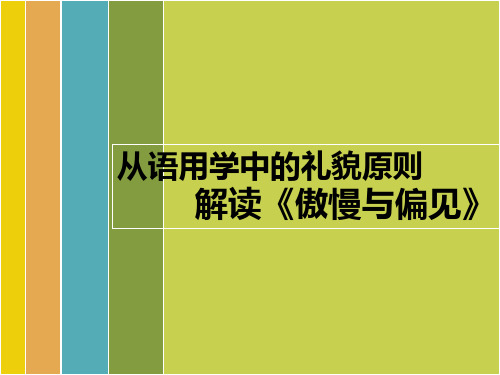
文学作品中的实际应用
·“与舞场里除了同来的女伴以外的任何别的女人 跳舞都是无法容忍的。” ——达西
在舞会上达西除了和同来的两位女伴跳舞之外拒绝和任何别 的女士跳舞,几乎贬损了全舞场的女士,甚至拒绝好友宾利先生
为他推荐的伊丽莎白小姐,严重违背了礼貌原则的得体准则、赞
扬准则、慷慨准则以及谦虚准则。
因此伊丽莎白一直对达西怀有很深的偏见也是顺理成章的。
国内研究
顾曰国基于尊重、谦逊、态度热情、文雅的汉语 言文化特征,仿照Leech的礼貌原则和次则,提出 了汉语的礼貌原则。 ①贬己尊人准则——指与自己或与自己有关的事 物时要贬,与听者或与听者有关的事物时要尊; ②称呼准则——用适切的称呼语与对方打招呼; ③文雅准则——所用语言要文雅,显示说话人有 教养; ④求同准则——说话人和听话人在诸多方面力求 和谐一致,量满足对方的欲望; ⑤德、言、行准则——在行为动机上,尽量减少 他人付出的代价,尽量增大对他人的益处。
理论在《傲慢与偏见》中的应用
。”
“贝内特小姐,说你愿意嫁给我。”
在对伊丽莎白求婚是违反了礼貌原则的得体准则。
这两句话,没有给听话人选择的余地,话语的语气减弱并带
有实验性的倾向,可以看出达西的骄傲自大,这也是他第一次求 婚遭到断然拒绝的原因之一。
理论在《傲慢与偏见》中的应用
国外的研究
E.Goffman从社会学角度提出了“面子”问题
要想自己不丢面子,最保险的方法就是不去伤害 别人的面子。因此,人们在谈话中往往是贬低自 己,抬高对方。
国外的研究
P.Brown和 S.Levinson合写了《语言运用中的 普遍性》 沿用了Goffman的“面子”概念,认为人有两 种面子。因此,礼貌行为也分两种,一种是积极 的(positive politeness),即满足对方面子 上正面的要求(如表扬对方的职业、地位、成就、 相貌、孩子等);一种是消极的(negative politeness),即满足对方面子上的反面需求 (如尽量不去侵犯对方的人身、财产、自由等)
礼貌原则及其在商务英语写作中的运用

2、表达自己的观点和要求
在写商务英语信函时,需要表达自己的观点和要求。此时,应尽可能使用礼 貌、委婉的语言,避免使用直接或冒犯的语言。例如,如果要提出批评或建议, 可以使用“我们希望您能……”、“我们建议您……”等语句,以减轻直接批评 或指责的语气。
3、结尾和敬意
在写商务英语信函时,结尾是非常重要的环节。在结尾处,可以再次强调与 对方建立良好商业关系的重要性,并表达对未来的期望和祝愿。同时,可以在结 尾处使用敬语或感谢语句,以表达对对方的尊重和感激之情。
结论
综上所述,礼貌原则在商务英语写作中具有重要的作用。通过尊重对方的文 化背景和习惯、使用正式的语言和措辞、避免使用过于口语化的语言以及合理运 用恰当的语气和表情等方式,可以增强商务英语写作的礼貌性,提高沟通效果。
还应注意保证商业邮件的格式和形式、简明扼要地表达内容以及避免使用夸 张的措辞等注意事项,以避免在写作过程中出现不当的错误。总之,注重礼貌原 则是提高商务英语写作水平和促进商务合作的关键要素之一。
礼貌原则的定义和重要性
礼貌原则是指通过语言表达对他人的尊重和关心,以建立积极的人际关系。 在商务英语写作中,礼貌原则体现在措辞得体、表达清晰、尊重对方等方面。礼 貌原则的重要性在于它有助于提高商务英语写作的水平,建立信任和友好的关系, 促进商务合作的发展。
礼貌原则在商务英语写作中的运 用
在商务英语写作中运用礼貌原则,可以从以下几个方面入手:
二、礼貌原则在商务英语信函写 作中的运用
礼貌原则在商务英语信函写作中的运用非常广泛,它贯穿于整个信函的始终。 下面,我们将分别探讨礼貌原则在商务英语信函写作中的几个具体运用:
1、建立良好的开端
在写商务英语信函时,建立良好的开端是至关重要的。为了表达对对方的尊 重和友好,可以在信函开头使用问候语,如“尊敬的”,以营造亲切、友好的氛 围。
中国礼貌原则

中国礼貌原则
1.贬己尊人准则
"夫礼者,自卑而尊人”,在谈到自己或和自己有关的事物时要“贬”、要“谦”;谈到听者或和听者有关的事物时要
“抬”、要“尊”。
如提到别人的意见时,往往将其尊称为“高见”,而提到自己的看法时,则称之为“拙见”。
2.称呼准则
"上下有异,贵贱有分,长幼有序”,它指用适当的称呼语主动跟对方打招呼。
如“王老”“陈师傅”“李大姐”等用以表现对年长之人的尊敬,而“小张”“乐乐”等则表现出对同辈或小辈的亲切。
3.文雅准则
选用雅语,禁用秽语;多用委婉语,少用直言。
如在商店里,售货员往往不直接问顾客:"你要买什么?"而是常说:"有什么可以帮您的?”
4.求同准则
"尚同”"满足对方""赞同对方",即交谈双方在诸多方面力求和谐一致,尽量满足对方要求。
例如,当接到对方的邀请时,我们往往是“恭敬不如从命”。
5.德、言、行准则
在行为动机上尽量减少他人付出的代价,尽量增大对他人的益处;在言辞上尽量夸大别人给自己的好处,尽量说小自己付出的代价。
例如:
甲:你真是帮了我大忙啊!
乙:哪里哪里,一点小事,举手之劳而已。
在顾曰国提出的“汉语礼貌原则”中,贬己尊人准则是核心准则,因此,其他四条准则都是围绕着这个核心展开的。
例如:
甲:你送给犬子的礼物太贵重了,这怎么好意思呢!
乙:只是一点小玩意儿,给令郎拿去玩就行了。
无论是在称呼方式上,还是交谈的过程中,始终都保持着对他人的“抬”与对自己的“贬”,夸大他人的好处,而说小自己付出的代价。
礼貌原则六个准则介绍
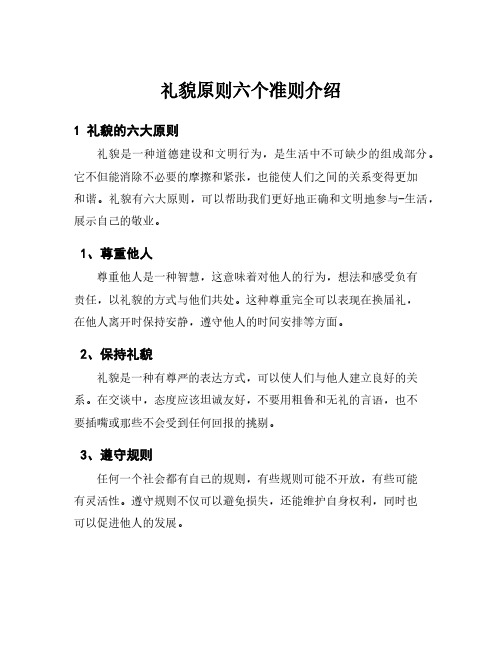
礼貌原则六个准则介绍1 礼貌的六大原则礼貌是一种道德建设和文明行为,是生活中不可缺少的组成部分。
它不但能消除不必要的摩擦和紧张,也能使人们之间的关系变得更加和谐。
礼貌有六大原则,可以帮助我们更好地正确和文明地参与-生活,展示自己的敬业。
1、尊重他人尊重他人是一种智慧,这意味着对他人的行为,想法和感受负有责任,以礼貌的方式与他们共处。
这种尊重完全可以表现在换届礼,在他人离开时保持安静,遵守他人的时间安排等方面。
2、保持礼貌礼貌是一种有尊严的表达方式,可以使人们与他人建立良好的关系。
在交谈中,态度应该坦诚友好,不要用粗鲁和无礼的言语,也不要插嘴或那些不会受到任何回报的挑剔。
3、遵守规则任何一个社会都有自己的规则,有些规则可能不开放,有些可能有灵活性。
遵守规则不仅可以避免损失,还能维护自身权利,同时也可以促进他人的发展。
4、敏感对待有不同的文化传统对不同的文化传统要敏感和尊重,无论是吃饭方式、穿着打扮等。
大家都应有礼貌地尊重他人,而不要拒绝他人,也不要嘲笑和轻视他人。
不仅如此,在参与不同宗教和活动中,应尽量避免熟悉却并不能去尊重的行为。
5、尊重属性每个人都有各种属性,这些属性能够增加他们的多样性,也应该受到尊重。
对他人的肤色、宗教信仰、同性恋身份等属性都应受到尊重,不要嘲笑或误解他们。
6、表达谢意表达谢意是一种礼貌的表现,当收到他人的帮助时,一定要及时表达自己的感激之情。
礼貌的谢意可以增加他人对你的好感,在同一社会中起着重要的作用,是一种提升活力的行为。
总而言之,礼貌,尊重,谦虚这些是社会处事的基本原则,让我们在社会中展示文明有礼,让大家共同享受着和谐平静的社会氛围。
合作原则和礼貌原则

合作原则和礼貌原则
合作原则:
1. 谦虚、宽容:我们要尊重彼此的思想、意见、行为,不断学习和改正,相互接纳,善待他人。
2. 协调沟通:我们要重视沟通,理解对方的观点,思考有效解决的办法,实现双赢。
3. 积极进取:我们要保持积极乐观的心态,勇于创新、担当组织,勇敢面对困难,努力克服挑战。
礼貌原则:
1. 诚信:遵守守信原则,严格执行合同,维护公平公正的法治秩序。
2. 尊重:我们要尊重人权,尊重彼此的文化、价值观,尊重大自然。
3. 互助:我们要互相帮助,团结协作,创造良性竞争环境,互利共赢。
言语交际中的礼貌原则与策略
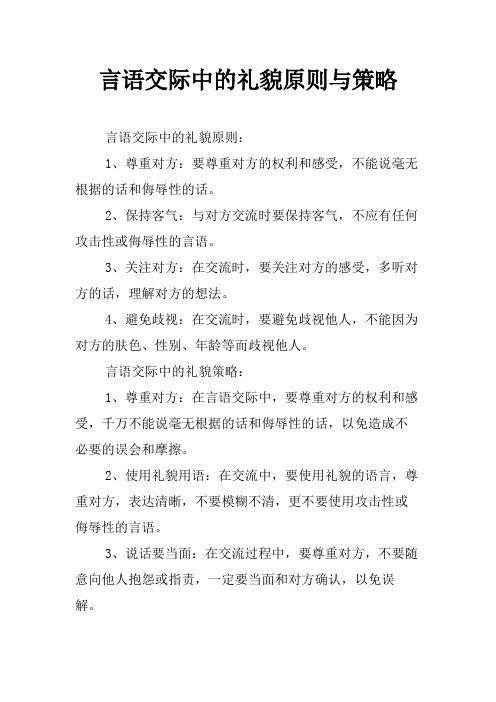
言语交际中的礼貌原则与策略
言语交际中的礼貌原则:
1、尊重对方:要尊重对方的权利和感受,不能说毫无根据的话和侮辱性的话。
2、保持客气:与对方交流时要保持客气,不应有任何攻击性或侮辱性的言语。
3、关注对方:在交流时,要关注对方的感受,多听对方的话,理解对方的想法。
4、避免歧视:在交流时,要避免歧视他人,不能因为对方的肤色、性别、年龄等而歧视他人。
言语交际中的礼貌策略:
1、尊重对方:在言语交际中,要尊重对方的权利和感受,千万不能说毫无根据的话和侮辱性的话,以免造成不必要的误会和摩擦。
2、使用礼貌用语:在交流中,要使用礼貌的语言,尊重对方,表达清晰,不要模糊不清,更不要使用攻击性或侮辱性的言语。
3、说话要当面:在交流过程中,要尊重对方,不要随意向他人抱怨或指责,一定要当面和对方确认,以免误解。
4、避免过分批评:在交流过程中,要避免过分批评或责骂,应根据实际情况进行客观的评价,不要把对方的错误当作是罪过。
礼貌原则的内涵
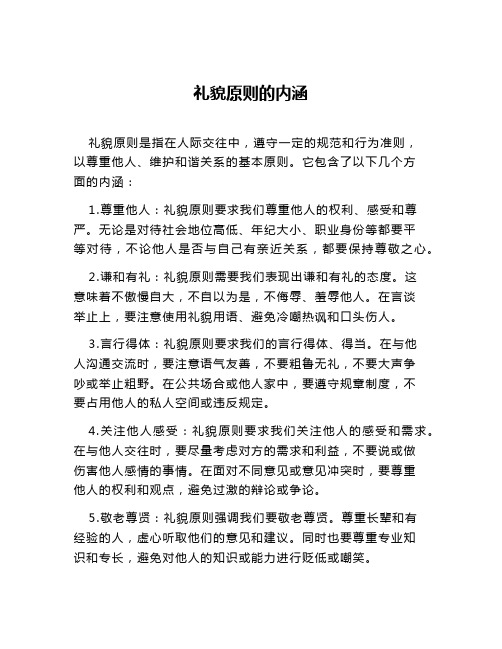
礼貌原则的内涵
礼貌原则是指在人际交往中,遵守一定的规范和行为准则,
以尊重他人、维护和谐关系的基本原则。
它包含了以下几个方
面的内涵:
1.尊重他人:礼貌原则要求我们尊重他人的权利、感受和尊严。
无论是对待社会地位高低、年纪大小、职业身份等都要平
等对待,不论他人是否与自己有亲近关系,都要保持尊敬之心。
2.谦和有礼:礼貌原则需要我们表现出谦和有礼的态度。
这
意味着不傲慢自大,不自以为是,不侮辱、羞辱他人。
在言谈
举止上,要注意使用礼貌用语、避免冷嘲热讽和口头伤人。
3.言行得体:礼貌原则要求我们的言行得体、得当。
在与他
人沟通交流时,要注意语气友善,不要粗鲁无礼,不要大声争
吵或举止粗野。
在公共场合或他人家中,要遵守规章制度,不
要占用他人的私人空间或违反规定。
4.关注他人感受:礼貌原则要求我们关注他人的感受和需求。
在与他人交往时,要尽量考虑对方的需求和利益,不要说或做
伤害他人感情的事情。
在面对不同意见或意见冲突时,要尊重
他人的权利和观点,避免过激的辩论或争论。
5.敬老尊贤:礼貌原则强调我们要敬老尊贤。
尊重长辈和有
经验的人,虚心听取他们的意见和建议。
同时也要尊重专业知
识和专长,避免对他人的知识或能力进行贬低或嘲笑。
遵守礼貌原则能够建立良好的人际关系,增进人与人之间的相互理解和尊重。
同时,它也能够提升个人的形象和修养,让我们更受人喜爱和尊重。
商务英语交际中的礼貌原则
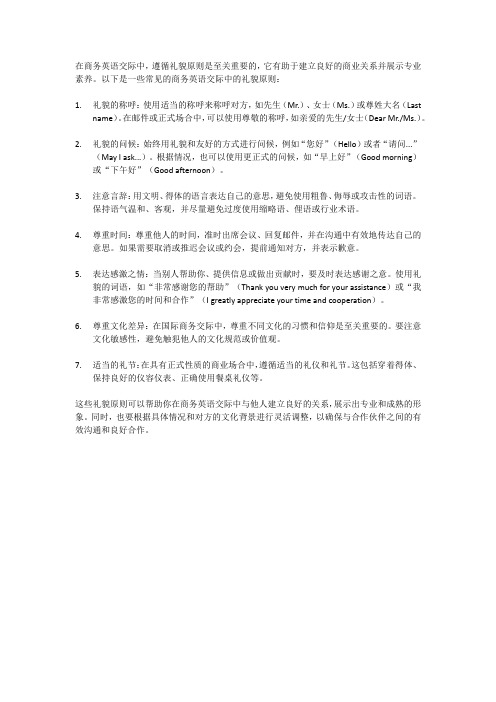
在商务英语交际中,遵循礼貌原则是至关重要的,它有助于建立良好的商业关系并展示专业素养。
以下是一些常见的商务英语交际中的礼貌原则:1.礼貌的称呼:使用适当的称呼来称呼对方,如先生(Mr.)、女士(Ms.)或尊姓大名(Lastname)。
在邮件或正式场合中,可以使用尊敬的称呼,如亲爱的先生/女士(Dear Mr./Ms.)。
2.礼貌的问候:始终用礼貌和友好的方式进行问候,例如“您好”(Hello)或者“请问...”(May I ask...)。
根据情况,也可以使用更正式的问候,如“早上好”(Good morning)或“下午好”(Good afternoon)。
3.注意言辞:用文明、得体的语言表达自己的意思,避免使用粗鲁、侮辱或攻击性的词语。
保持语气温和、客观,并尽量避免过度使用缩略语、俚语或行业术语。
4.尊重时间:尊重他人的时间,准时出席会议、回复邮件,并在沟通中有效地传达自己的意思。
如果需要取消或推迟会议或约会,提前通知对方,并表示歉意。
5.表达感激之情:当别人帮助你、提供信息或做出贡献时,要及时表达感谢之意。
使用礼貌的词语,如“非常感谢您的帮助”(Thank you very much for your assistance)或“我非常感激您的时间和合作”(I greatly appreciate your time and cooperation)。
6.尊重文化差异:在国际商务交际中,尊重不同文化的习惯和信仰是至关重要的。
要注意文化敏感性,避免触犯他人的文化规范或价值观。
7.适当的礼节:在具有正式性质的商业场合中,遵循适当的礼仪和礼节。
这包括穿着得体、保持良好的仪容仪表、正确使用餐桌礼仪等。
这些礼貌原则可以帮助你在商务英语交际中与他人建立良好的关系,展示出专业和成熟的形象。
同时,也要根据具体情况和对方的文化背景进行灵活调整,以确保与合作伙伴之间的有效沟通和良好合作。
中外社会礼貌原则及其差异分析

尊重长辈是中国社会的基本礼 貌原则之一
尊重长辈体现在日常生活中的 言行举止中
尊重长辈包括尊重他们的意见 和建议
尊重长辈也包括尊重他们的生 活习惯和兴趣爱好
面子是中国社会礼貌原则的核心 面子代表着一个人的尊严和地位 面子的维护和维护他人的面子是中国社会礼貌原则的重要表现 面子的维护和维护他人的面子是中国社会礼貌原则的重要表现
中国社会结构:强调集体主义和团结合 作
西方社会结构:强调个人主义和竞争精 神
中国社会结构:注重礼仪和礼节,强调 尊卑有序
西方社会结构:注重平等和尊重,强调 个人权利和自由
中国:注重礼仪,讲究礼节 和礼貌
西方:注重个人主义,强调 自由与独立
中国:注重集体主义,强调 和谐与团结
西方:注重平等,强调尊重 和平等
尊重文化差异:理解并尊重不同文化的 礼仪规范
语言表达:使用礼貌、得体的语言表达 方式
肢体语言:注意肢体语言的使用,避免 误解
礼物赠送:了解不同文化的礼物赠送习 惯,避免冒犯
餐桌礼仪:了解不同文化的餐桌礼仪, 避免失礼
社交场合:了解不同文化的社交场合礼 仪,避免尴尬
尊重文化差异:了解并尊 重不同文化的价值观和行 为规范
礼貌原则包括尊重他人、遵守社会规范、避免冒犯他人等。 礼貌原则在不同文化中有不同的表现形式和侧重点。 礼貌原则的遵守有助于建立良好的人际关系,促进社会和谐。
发展:随着社会的发展和进步, 礼貌原则逐渐演变为现代社会 的礼仪规范
起源:礼貌原则起源于古代社 会,是人们在交往中逐渐形成 的一种行为规范
影响:礼貌原则对人们的行为 和交往方式产生了深远的影响
尊重他人:尊 重他人的权利 和尊严,避免
冒犯他人
谦逊有礼:谦 虚谨慎,不张
- 1、下载文档前请自行甄别文档内容的完整性,平台不提供额外的编辑、内容补充、找答案等附加服务。
- 2、"仅部分预览"的文档,不可在线预览部分如存在完整性等问题,可反馈申请退款(可完整预览的文档不适用该条件!)。
- 3、如文档侵犯您的权益,请联系客服反馈,我们会尽快为您处理(人工客服工作时间:9:00-18:30)。
Leech (1983) formulates ‘Politeness Principle’, or PP for short, trying to remedy Grice’s (1975) Cooperative Principle (CP) which is presumed to be unable to interpret why, for instance, people are prone to use indirect ways of saying things. To Leech, it is politeness that motivates it.Social acts like competitives (ordering, asking, begging, etc.) demand politeness far more than other kinds like convivials and collaboratives, because the former makes a threat to the audience’s face, or negative face (in Brown and Levinson’s (1978/1987) terms). V arious politeness strategies, thus, are employed to mitigate the face-threatening power. According to Leech, the greater the cost an act is (be it verbal or non-verbal) to the audience, the more polite the speaker ought to try to make the utterance. 1) is a request, and it is (made) polite by (means of) the smallness of the cost to the other person, and the politeness particle please. 2) is an order, impolite in nature. So is 3), ruder and more dangerous for it is robbery.1) Give me ten cents, please.2) Put up your hand!3) Give me all your money and get out of the house.If the act is benefit (beneficial) to the hearer, the speaker does not have to sound polite, or extremely so, for the benefit speaks for itself. 4-5) are polite requests, so please as a token of politeness is not necessary, least so with 6) which is a huge if not impossible benefit.4) Y ou can take this newspaper.5) Take this bike.6) Drive my car away as you please.The PP of Leech has six maxims (below is adapted from Leech: P. 132):(1) Tact Maxim: Minimize cost to hearer; maximize benefit to hearer.(2) Generosity Maxim: Minimize benefit to speaker; maximize cost to speaker.(3) Approbation Maxim: Minimize dispraise of hearer; maximize praise of hearer.(4) Modesty Maxim: Minimize praise of speaker; maximize dispraise of speaker.(5) Agreement Maxim: Minimize disagreement between speaker and hearer; maximize agreement between speaker and hearer.(6) Sympathy Maxim: Minimize antipathy between speaker and hearer; maximize sympathy between speaker and hearer.We do not have to exemplify all the maxims, for most of them are self-evident, and we can easily detect that these maxims are not equally true with all cultures. Between the east and the west there may be found some noticeable differences, but in spite of that, Leech doubts if there is any ‘divide’. (Leech 2005) According to him, the PP as a principle is universal across cultures. Differences lie only in the social parameters of politeness like age, sex, rank of imposition represented by the saying, social distance between the two people or sides, relative power of one person over the other, and so on. When Americans and Chinese receive the same praise, for instance, the former like to thank or appreciate the praiser, while the latter try all means to minimize their own praise-worthy merit. But this does not mean that Americans disobey the Modesty Maxim. Thanking in this case implies modesty by thanking the praiser or other people (like the good director or teacher of the praised), and over-dispraising self is a typical (extreme) modesty model in the eastern culture. So the skepticism about the universality of PP all over the globe, which seemed to be gaining ground in the two or three decades after the appearance of Leech (1983), does not really hold under scrutiny.作为社会的人、社交的人、合作的人——作为人,我们需要礼貌。
Grice(1975)论述了“合作原则”,但是没有讨论礼貌原则(Politeness Principle,简称PP),是Leech(1983)把接力棒接了过来,以图弥补或拯救“合作原则”难以解释人们有时使用间接表达式的倾向。
根据Leech,这其实就是为了礼貌。
他把语用原则分为“篇章修辞”(textual rhetoric)——即布局谋篇、巧说俗话的策略,和“人际修辞”(interpersonal rhetoric)——即为人处世的策略,而合作原则和礼貌原则都属于后者。
假如言语分为“竞争类”(competitive)——命令、请求等,“和谐类”(convivial)——祝福、感谢等,“合作类”(collaborative)——告诉、通报等,“冲突类”(conflictive)——咒骂、威胁等,那么“竞争类”是最需要礼貌策略的行为。
比较而言,“和谐类”本质上是礼貌的,“合作类”一般无所谓礼貌不礼貌,而“冲突类”本质上是不礼貌的。
“礼貌原则”有6条准则(改编自Leech:132页):(1)策略准则(Tact Maxim,也叫“得体准则”——用于指令和承诺):尽力缩小对方的损失,尽力扩大对方的好处。
如例1)。
要求越大,就越要礼貌和策略。
(2)慷慨准则(Generosity Maxim,也叫“宽宏准则”——用于指令和承诺):尽力缩小自己的好处,尽力扩大自己的损失。
如例4-6)所示。
(3)褒奖准则(Approbation Maxim,也叫“赞扬/赞誉准则”——用于表情和表述):尽力缩小对对方的诋毁,尽力扩大对对方的赞扬。
如例7)中Allen的话——哪怕对方唱歌很平常,也要赞扬。
(4)谦逊准则(Modesty Maxim,也叫“谦虚准则”——用于表情和表述):尽力缩小对自己的赞扬,尽力扩大对自己的诋毁。
如例7)中Marie的话。
中国人和日本人此时会说“其实很难听”之类的自我诋毁话语。
(5)赞同准则(Agreement Maxim,也叫“一致准则、同意准则”——用于表述):尽力缩小与对方的分歧,尽力扩大与对方的一致。
如例8)乙所说的话,即使听到的是胡扯,也不能说是胡扯。
(6)同情准则(Sympathy Maxim——用于表述):尽力缩小对对方的厌烦,尽力扩大对对方的同情(和好感)。
如例9)中乙的话语。
7)Allen: Y ou have a nightingale’s voice.Marie: Thank you. I used to have a good teacher in college.8)甲:重庆是中国最大的城市。
